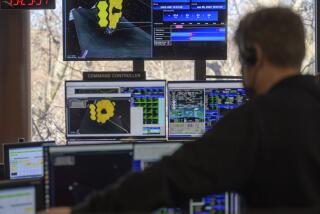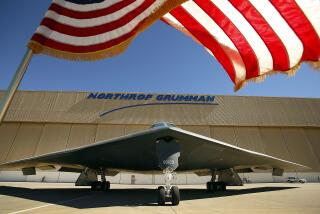Northrop Wins Battle to Purchase Grumman : Industry: L.A.-based firm outbids Martin Marietta with $2.17-billion offer. Deal will not stem loss of jobs.
- Share via
Northrop Corp., finally the winner in one of the takeover contests that are remaking the post-Cold War defense industry, said Monday it agreed to buy Grumman Corp. of Bethpage, N.Y., for $2.17 billion.
The deal ended a four-week tussle over Grumman between Los Angeles-based Northrop and aerospace giant Martin Marietta Corp. of Bethesda, Md. Many industry analysts had said Northrop needed victory to preserve its independence; had it failed, other defense firms might have set their sights on the company, which builds the B-2 stealth bomber.
Northrop prevailed with a final offer of $62 a share, up $2 from its initial bid. Martin Marietta stood pat at its original offer of $55 a share, or $1.93 billion.
The acquisition ranks the firm--which will keep its headquarters in Los Angeles and take the name Northrop Grumman Corp.--among the biggest prime contractors in the defense business, analysts say. The new entity will have annual sales exceeding $8 billion and--initially, at least--more than 40,000 employees.
The deal enables Northrop to “pursue its primary business objective of being a key member of the nation’s defense industrial team well into the 21st Century,” Chairman Kent Kresa said.
But Northrop’s victory, which followed several failed attempts by the company to acquire a defense firm, will do nothing to stem the elimination of thousands of jobs at Northrop and Grumman because of continued defense budget cuts.
In fact, the acquisition to some degree will exacerbate the problem, as Northrop seeks to efficiently merge Grumman’s operations--which are primarily in New York and Florida--into its own.
“The combined Northrop Grumman is still going to have to get a lot smaller than the companies are separately today,” said Richard A. Bitzinger, an analyst with the Defense Budget Project, a nonpartisan research firm in Washington.
In a telephone interview, Kresa minimized the likely job losses attributable to the acquisition, but noted that significant employment cuts already are planned by each company.
Last month, Northrop said it will eliminate another 3,000 jobs--10% of its work force--this year. And with the acquisition, “there will clearly be some areas where we can gain some economies of scale, and there could be some minor job losses due to those economies,” Kresa said. “But it’s small compared to the numbers (of layoffs) we’re facing due to the realities of our business.
“It’s also important to realize that we don’t see any wholesale movement of jobs out of California that would move east” to Grumman sites, Kresa said.
Northrop builds the B-2 bomber in Palmdale and Pico Rivera, much of the F/A-18 fighter attack jet in El Segundo, the fuselage for Boeing’s 747 passenger jet in Hawthorne and missiles and defense electronics at various sites.
Grumman also makes defense electronics and airborne surveillance systems, and it provides upgrades for its famed F-14 fighter bomber--which is no longer in production--and other aircraft.
One key contract that Grumman brings to Northrop is the joint surveillance and target attack radar system, or JSTARS, a system for detecting enemy ground forces that was used in the Persian Gulf War.
“This will be a good, strong program for several years out,” said Thomas Canning, aerospace analyst at Standard & Poor’s Corp.
Northrop, though strong financially, needed a deal to avoid becoming a takeover target itself amid the defense industry’s consolidation wave. The industry’s shrinkage is producing a handful of giant companies with sales of $8 billion or more a year; analysts said Northrop, with 1993 sales of $5.1 billion, needed to grow quickly.
The pressure to expand by acquisition was heightened because Northrop’s huge B-2 program is scheduled to end in 1997-98, when the firm completes the last of the 20 B-2s ordered by the Air Force.
Indeed, there had been speculation on Wall Street that Northrop, even if it succeeded in buying Grumman, would remain vulnerable to a takeover. Kresa declined to comment Monday, except to reiterate that the company is not for sale.
With the Grumman deal, Northrop is poised to be the defense-aircraft equivalent of the auto industry’s Chrysler Corp., Bitzinger said: a distant third-ranked player, but still thriving. In Northrop’s case, its two bigger rivals are Calabasas-based Lockheed Corp. and St. Louis-based McDonnell Douglas Corp.
Nor is the deal likely to be Northrop’s last.
It is widely expected that Northrop will exercise its option to buy the 51% of Vought Aircraft Co. that it does not already own. Vought, based in Dallas, makes subsections for a variety of commercial and military planes.
Kresa strongly hinted that Northrop will take that step, though it has three years beginning in 1995 to exercise the option. “Right now I see it fitting,” he said of acquiring Vought, “but we have some time to sort that out.”
Grumman originally agreed March 7 to merge with Martin Marietta for $55 a share, after Grumman had spent the past year quietly talking merger with Northrop. Three days later, Northrop launched its competing bid of $60 a share.
But after Grumman asked for one last round of sealed bids, due last Thursday, Martin Marietta decided “it would not be in the best interests” of its stockholders to go higher, Chairman Norman R. Augustine said in a letter to Grumman’s directors.
Still, because Grumman had first agreed to merge with Martin Marietta, Northrop and Grumman will have to pay Martin Marietta a $50-million “breakup fee.” Martin Marietta said it is also entitled to up to $8.8 million to cover its fees and expenses related to the merger effort.
In choosing Northrop’s final bid, Grumman Chairman Renso L. Caporali said Northrop’s $7-a-share premium over Martin Marietta’s offer “is an excellent deal for our shareholders.” But not all of Grumman’s shareholders prospered. Some Wall Street arbitragers, or takeover speculators, and other investors had bet that the bidding would go higher, trading Grumman’s stock up to nearly $65 a share late last week.
After Northrop and Grumman announced their deal, Grumman stock, predictably, tumbled $2.94 a share, to close at $61.69, in New York Stock Exchange composite trading. Northrop closed at $37.625, down $2.25, while Martin Marietta lost $1.375 to end the day at $42.625 a share.
* HIGH STAKES: Why Northrop was willing to pay more than Martin Marietta for Grumman. D1
More to Read
Inside the business of entertainment
The Wide Shot brings you news, analysis and insights on everything from streaming wars to production — and what it all means for the future.
You may occasionally receive promotional content from the Los Angeles Times.











